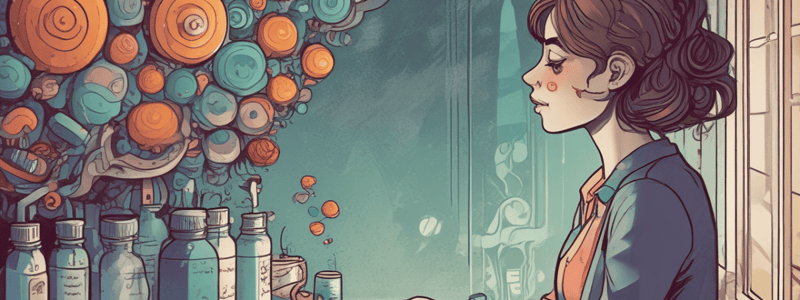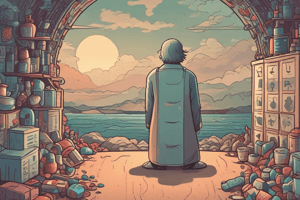Podcast
Questions and Answers
What percentage of people will experience depression at some point in their lives?
What percentage of people will experience depression at some point in their lives?
- 10%
- 30%
- 40%
- 20% (correct)
What is the term for the condition characterized by excessive sadness and low mood?
What is the term for the condition characterized by excessive sadness and low mood?
- Monoamine dysfunction
- Psychotic episode
- Affective disorder (correct)
- Bipolar disorder
Which of the following is NOT a type of antidepressant drug?
Which of the following is NOT a type of antidepressant drug?
- Antipsychotic drugs (correct)
- Monoamine uptake inhibitors
- Monoamine oxidase inhibitors
- Monoamine receptor agonists
What percentage of depression cases are associated with stressful life events?
What percentage of depression cases are associated with stressful life events?
What is the estimated percentage of the population affected by bipolar depression?
What is the estimated percentage of the population affected by bipolar depression?
Which of the following is a theory that suggests depression is caused by a functional deficit of monoamine transmitters?
Which of the following is a theory that suggests depression is caused by a functional deficit of monoamine transmitters?
What is the effect of reserpine on the brain?
What is the effect of reserpine on the brain?
What is the effect of cortisol on the body?
What is the effect of cortisol on the body?
What is the effect of SSRIs on glucocorticoid receptors in the hippocampus?
What is the effect of SSRIs on glucocorticoid receptors in the hippocampus?
What is the primary mechanism of action of lithium?
What is the primary mechanism of action of lithium?
What is the primary side effect of anti-muscarinic (M1) antagonists?
What is the primary side effect of anti-muscarinic (M1) antagonists?
Which of the following antidepressant drugs is associated with the greatest risk of sexual dysfunction?
Which of the following antidepressant drugs is associated with the greatest risk of sexual dysfunction?
What is the primary mechanism of action of electroconvulsive therapy (ECT)?
What is the primary mechanism of action of electroconvulsive therapy (ECT)?
What is the primary advantage of monoamine receptor antagonists compared to other types of antidepressant drugs?
What is the primary advantage of monoamine receptor antagonists compared to other types of antidepressant drugs?
What is an example of a therapeutic use of valproate?
What is an example of a therapeutic use of valproate?
What is the primary effect of decreased brain-derived neurotrophic factor (BDNF) on the brain?
What is the primary effect of decreased brain-derived neurotrophic factor (BDNF) on the brain?
What is the primary mechanism of action of tricyclic antidepressants (TCAs)?
What is the primary mechanism of action of tricyclic antidepressants (TCAs)?
Which of the following antidepressants is associated with the most severe side effects?
Which of the following antidepressants is associated with the most severe side effects?
What is the primary effect of chronic administration of selective serotonin reuptake inhibitors (SSRIs)?
What is the primary effect of chronic administration of selective serotonin reuptake inhibitors (SSRIs)?
What is the primary mechanism of action of monoamine oxidase inhibitors (MAOIs)?
What is the primary mechanism of action of monoamine oxidase inhibitors (MAOIs)?
What is the primary advantage of selective serotonin reuptake inhibitors (SSRIs) compared to tricyclic antidepressants (TCAs)?
What is the primary advantage of selective serotonin reuptake inhibitors (SSRIs) compared to tricyclic antidepressants (TCAs)?
What is the 'cheese reaction' associated with monoamine oxidase inhibitors (MAOIs)?
What is the 'cheese reaction' associated with monoamine oxidase inhibitors (MAOIs)?
What is the primary difference between monoamine oxidase inhibitors (MAOIs) and tricyclic antidepressants (TCAs)?
What is the primary difference between monoamine oxidase inhibitors (MAOIs) and tricyclic antidepressants (TCAs)?
What is the primary effect of decreased neuroplasticity and neurogenesis on depression?
What is the primary effect of decreased neuroplasticity and neurogenesis on depression?
What is the primary mechanism of action of tricyclic antidepressants (TCAs) on postsynaptic receptors?
What is the primary mechanism of action of tricyclic antidepressants (TCAs) on postsynaptic receptors?
Unipolar depression is associated with a hereditary tendency.
Unipolar depression is associated with a hereditary tendency.
Reserpine induces depression by increasing the levels of monoamine transmitters in the brain.
Reserpine induces depression by increasing the levels of monoamine transmitters in the brain.
All antidepressant drugs work by increasing the levels of monoamine neurotransmitters in the brain
All antidepressant drugs work by increasing the levels of monoamine neurotransmitters in the brain
Cortisol has a positive feedback effect on the hypothalamic-pituitary-adrenal axis in depressed patients.
Cortisol has a positive feedback effect on the hypothalamic-pituitary-adrenal axis in depressed patients.
The primary mechanism of action of lithium is through the inhibition of monoamine uptake
The primary mechanism of action of lithium is through the inhibition of monoamine uptake
Antidepressants have a rapid effect on mood, often taking only hours to develop.
Antidepressants have a rapid effect on mood, often taking only hours to develop.
Depression is a mood disorder characterized by excessive happiness and elevated mood
Depression is a mood disorder characterized by excessive happiness and elevated mood
Cocaine has an antidepressant effect by blocking the uptake of monoamine transmitters.
Cocaine has an antidepressant effect by blocking the uptake of monoamine transmitters.
Bipolar disorder is a type of depression
Bipolar disorder is a type of depression
SSRIs decrease the levels of glucocorticoid receptors in the hippocampus.
SSRIs decrease the levels of glucocorticoid receptors in the hippocampus.
Excessive consumption of alcohol is associated with lower levels of depression
Excessive consumption of alcohol is associated with lower levels of depression
Mirtazapine is an α2, 5-HT2C, 5-HT3 agonist.
Mirtazapine is an α2, 5-HT2C, 5-HT3 agonist.
Trazodone is a 5-HT2A, 5-HT2C, H1 agonist and a strong 5-HT/NA reuptake inhibitor.
Trazodone is a 5-HT2A, 5-HT2C, H1 agonist and a strong 5-HT/NA reuptake inhibitor.
Electroconvulsive therapy (ECT) involves the use of neuromuscular blocking agents and artificial ventilation.
Electroconvulsive therapy (ECT) involves the use of neuromuscular blocking agents and artificial ventilation.
Lithium inhibits glycogen synthase 1 (GSK1) isoforms.
Lithium inhibits glycogen synthase 1 (GSK1) isoforms.
Risperidone is a mood stabilizer used to treat bipolar disorder.
Risperidone is a mood stabilizer used to treat bipolar disorder.
Monoamine receptor antagonists are associated with side effects mediated by 5-HT2A and 5-HT3.
Monoamine receptor antagonists are associated with side effects mediated by 5-HT2A and 5-HT3.
Tricyclic antidepressants are competitive, non-selective inhibitors of serotonin, norepinephrine, and dopamine.
Tricyclic antidepressants are competitive, non-selective inhibitors of serotonin, norepinephrine, and dopamine.
Monoamine oxidase inhibitors (MAOIs) are selective and competitive inhibitors of MAO-A and MAO-B.
Monoamine oxidase inhibitors (MAOIs) are selective and competitive inhibitors of MAO-A and MAO-B.
Selective serotonin reuptake inhibitors (SSRIs) are more effective than tricyclic antidepressants (TCAs) in severe depression.
Selective serotonin reuptake inhibitors (SSRIs) are more effective than tricyclic antidepressants (TCAs) in severe depression.
Chronic administration of selective serotonin reuptake inhibitors (SSRIs) leads to an increase in 5-HT1A and 5-HT2 receptors.
Chronic administration of selective serotonin reuptake inhibitors (SSRIs) leads to an increase in 5-HT1A and 5-HT2 receptors.
Monoamine oxidase inhibitors (MAOIs) are associated with a higher risk of sexual dysfunction compared to tricyclic antidepressants (TCAs).
Monoamine oxidase inhibitors (MAOIs) are associated with a higher risk of sexual dysfunction compared to tricyclic antidepressants (TCAs).
Tricyclic antidepressants (TCAs) are non-competitive, non-selective, long-lasting inhibitors of serotonin, norepinephrine, and dopamine.
Tricyclic antidepressants (TCAs) are non-competitive, non-selective, long-lasting inhibitors of serotonin, norepinephrine, and dopamine.
Monoamine oxidase inhibitors (MAOIs) are associated with a higher risk of ventricular dysrhythmia compared to tricyclic antidepressants (TCAs).
Monoamine oxidase inhibitors (MAOIs) are associated with a higher risk of ventricular dysrhythmia compared to tricyclic antidepressants (TCAs).
Chronic administration of tricyclic antidepressants (TCAs) leads to an increase in β1, β2, α2, 5-HT1A, 5-HT1B/D, and 5-HT2 receptors.
Chronic administration of tricyclic antidepressants (TCAs) leads to an increase in β1, β2, α2, 5-HT1A, 5-HT1B/D, and 5-HT2 receptors.
Selective serotonin reuptake inhibitors (SSRIs) are competitive, non-selective inhibitors of serotonin, norepinephrine, and dopamine.
Selective serotonin reuptake inhibitors (SSRIs) are competitive, non-selective inhibitors of serotonin, norepinephrine, and dopamine.
Monoamine oxidase inhibitors (MAOIs) are associated with a higher risk of nausea and headache compared to tricyclic antidepressants (TCAs).
Monoamine oxidase inhibitors (MAOIs) are associated with a higher risk of nausea and headache compared to tricyclic antidepressants (TCAs).
Flashcards are hidden until you start studying
Study Notes
Depression
- 20% of people will experience depression at some point in their lives
- Depression is associated with a significantly worse survival rate from cancer and heart disease
- Excessive consumption of alcohol is associated with higher levels of depression, as well as suicide and self-harm
Theories of Depression
- Monoamine Theory (Schildkraut, 1965): Depression is caused by a functional deficit of monoamine transmitters (NA/5-HT) at certain sites of the brain
- Neuroendocrine Theory: Often depression follows periods of stress, leading to increased cortisol levels and negative feedback by cortisol
- Neuroplasticity/Neurogenesis Theory: Periods of depression are associated with decreased brain activity, neuronal loss, and ventricular enlargement
Antidepressant Drugs
- Three main types of antidepressants:
- Monoamine Uptake Inhibitors: Tricyclic antidepressants (TCA), selective serotonin reuptake inhibitors (SSRI)
- Monoamine Receptor Antagonists: α2 antagonists, 5-HT2 antagonists
- Monoamine Oxidase Inhibitors (MAOI)
Tricyclic Antidepressants (TCA)
- Non-selective, competitive monoamine reuptake inhibitor
- Chronic administration leads to downregulation of β1, α2, 5-HT1A, 5-HT1B/D, and 5-HT2 receptors
- Side effects: anti-histamine (H1), anti-adrenergic (α1), anti-muscarinic (M1), and drug-drug interactions
Selective Serotonin Reuptake Inhibitors (SSRI)
- Competitive or non-competitive inhibitors of SERT
- Chronic administration leads to downregulation of 5-HT1A, 5-HT1B/D, and 5-HT2 receptors
- Side effects: insomnia, sexual dysfunction, nausea, and headache
Monoamine Oxidase Inhibitors (MAOI)
- Inhibit the metabolism of monoamines (MAO-A and MAO-B)
- Chronic administration leads to downregulation of β1, β2, α2, 5-HT1A, 5-HT1B/D, and 5-HT2 receptors
- Side effects: food and drug interactions, 'cheese reaction', 'serotonin syndrome', and lack of specificity
Bipolar Disorder
- Affects 1-3% of the population
- Characterized by mood swings between depression and mania
- Treatment: lithium, valproate, and risperidone
Lithium Mechanism of Action
- Inhibits glycogen synthase 3 (GSK3) isoforms
- Slows accumulation of IP1 and IP3 over 2 weeks
- Side effects: nausea, tremor, renal effects, weight gain, and hyperthyroidism
Studying That Suits You
Use AI to generate personalized quizzes and flashcards to suit your learning preferences.




